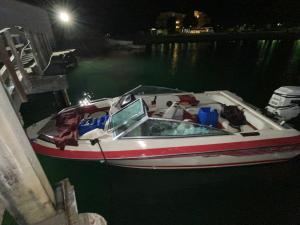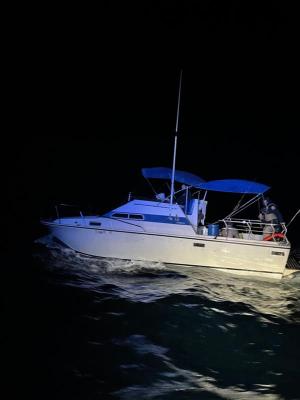July 4 Weekend Saw Multiple Attempts to Enter U.S. Illegally Off Southern California Coast
Federal officials stopped multiple attempts to illegally enter the U.S. by sea along the coast of Southern California over the July 4 holiday weekend.
“This weekend saw an increase to our already high numbers of interdictions at sea. Smuggling organizations are looking to take advantage of better weather conditions and sea states, as well as more legitimate recreational boating traffic,” said Brandon Tucker, director of the U.S. Customs and Border Protection San Diego Air and Marine Branch. “We anticipate that we will continue to see these high numbers of attempts as summer continues, and we are working with our partners to stop these potentially dangerous maritime smuggling attempts.”

The attempts included vessels running miles offshore to avoid detection, as well as attempts to blend into legitimate recreational boating traffic in broad daylight, and those attempting to simply swim north to the U.S. shore or use a personal watercraft.
“Safety of life at sea remains the highest priority for the Coast Guard,” said Capt. Timothy Barelli, commander, U.S. Coast Guard Sector San Diego. “Over this past holiday weekend we saw an all-around increase in maritime activity, which included non-U.S. citizens risking their lives to illegally enter the United States via the South Pacific marine boundary line. There is grave risk of capsizing, hypothermia, and drowning.”
Some of the events from this weekend included:
- On Thursday, June 30, at about 10:40 p.m., a crew aboard an Air and Marine Operations (AMO) multi-role enforcement aircraft (MEA) detected an open hull recreational boat, and contacted the crew of the U.S. Coast Guard Cutter Robert Ward, patrolling nearby. The crew of the cutter interdicted the vessel approximately 15 nautical miles west of La Jolla with six people on board.
- On Saturday, July 2, the Joint Harbor Operations Center alerted CBP Air and Marine Operations agents to an abandoned jet ski found on the beach about one half mile south of the Imperial Beach Pier, suspected of being used to illegally enter the U.S.
- On Saturday, July 2, a crew aboard an AMO MEA detected a recreational boat. The crew of the MEA continued tracking the vessel as it traveled northbound, eventually turning tracking over to the crew of the U.S. Coast Guard Cutter Ward. The USCG crew continued tracking the boat, coordinating with the crew aboard a CBP Air and Marine Operations boat to interdict the suspected smuggling vessel. At about 2:40 a.m. on July 3, the AMO crew stopped the vessel approximately 27 nautical miles west of La Jolla with 14 individuals on board.
- On Sunday, July 3, at about 7 a.m., a crew aboard the U.S. Coast Guard Cutter Petrel stopped a recreational boat entering Mission Bay, and discovered 12 people on board.
- On Sunday, July 3, at about 1:50 p.m., a crew aboard a CBP Air and Marine Operations boat stopped a recreational boat off shore, just west of Point Loma, with 12 people on board.
- On Sunday, July 3, at approximately 10:50 p.m., the Joint Harbor Operations Center contacted U.S. Border Patrol dispatch in San Diego regarding a possible maritime smuggling event in the vicinity of Buccaneer Beach in Oceanside. Border Patrol Agents responded to the scene and conducted an extensive search of the area with negative results. Residents in the area reported seeing 15-20 individuals run from the vessel and load into two awaiting vehicles.
- On Monday, July 4, at about 10:20 p.m. a crew aboard a CBP Air and Marine Operations boat pulled four individuals out of the water just north of the boundary line between the U.S. and Mexico who were attempting to illegally swim into the U.S.

In each case, the individuals apprehended were turned over to U.S. Border Patrol agents, who confirmed that none of the persons had status to legally enter the U.S., and processed them for removal. Agents with CBP Air and Marine Operations seized the various vessels and personal watercraft used in the suspected smuggling attempts.
“We will continue to ensure safety and security along both our land and maritime borders here in California,” said Chief Heitke of U.S. Border Patrol San Diego Sector. “We have seen too many of these kinds of maritime smuggling attempts turn tragic, and are thankful that in each case this weekend, the individuals were safe.”
Through the Regional Coordinating Mechanism (ReCoM), multiple agencies in the San Diego region routinely share intelligence, coordinate assets for coverage, patrols, and response, leverage resources dedicated to securing San Diego waterways plan operations and more. ReCoM partners, in addition to their standard patrols, perform targeted operations as conditions dictate and resources permit. Officials from U.S. Customs and Border Protection, including Air and Marine Operations, the U.S. Border Patrol, and the Office of Field Operations, as well as the U.S. Coast Guard and Homeland Security Investigations, have worked with law enforcement and public safety partners to ensure safe and legitimate maritime recreational activities and to target those criminal organizations attempting to blend and obscure their smuggling activities.




